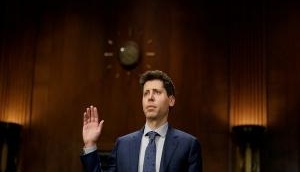
Delhi High Court on Tuesday sought response of the Centre and AAP government on Uber's plea that the authorities be restrained from interfering with its business.
A bench of Chief Justice G Rohini and Justice Jayant Nath issued notice to the central and Delhi governments as well as the city traffic police seeking their replies on the petition of Uber, which runs an app-based taxi service in the national capital by using All India Tourist Permit (AITP) cabs running on diesel.
"Issue notice... Returnable on November 23," the bench said, which dismissed a connected petition of the company in which it had challenged the city government's Radio Taxi Scheme of 2006.
Uber BV, the parent company based in Netherlands, as well as its two Indian arms--Uber India Technology Pvt Ltd and Uber India Systems Pvt Ltd--have in their petition also challenged rejection of their application for licence to ply in the city.
Uber had applied under the modified Radio Taxi Scheme, but the government rejected their application on September 1, 2015, saying they have to apply under the new City Taxi Scheme, its petition has said.
The company, in its plea, has challenged the new scheme of the Delhi government as well as the September 1 order and has sought directions to the city government to issue them a licence to ply.
During the hearing, advocate Prabhsahay Kaur, appearing for the Delhi government, told the bench that the company was "violating with impunity" orders of the high court regarding running of diesel cabs without meters in the city.
In response to the court's query as to what action was being taken, she said the authorities were impounding the illegally operating taxis.
Meanwhile, senior advocate Rajiv Nayar, appearing for Uber, contended the Supreme Court did not ban plying of AITP diesel cabs in the national capital.
He also said the new scheme was ultra vires the Constitution as the city government did not have the jurisdiction to regulate cabs having AITP and only the central government can legislate on the issue.
Uber has contended that the new scheme is 'targeted' at companies like it as it requires them to share their location, whereas radio taxis do not have to.
Under the new scheme, the definition of 'clean fuel' is limited to CNG and LPG and Uber has contended that such a restriction is "unreasonable".
The scheme also caps the number of taxis per licence at 2,500 apart from making it mandatory that cabs operated by app-based companies to obtain a contract carriage permit as well as have public service vehicle badges, all of which according to Uber are also "unreasonable restrictions".
Uber has also opposed various other requirements, like providing a printed bill, displaying name of licensee (Uber or Ola) and displaying in the cab the details of the driver, stipulated under the 2015 scheme.
Under the scheme, licensees like Uber and Ola would be liable for injury, harm or any other offence committed by the cab driver.
It also requires the companies to charge fares as prescribed by the transport department. On July 29, the high court had upheld Delhi government's January 1 order by which all app-based cab services which did not conform to the Radio Taxi Scheme 2006-modified in December last year-were banned from operating in the city.
ANI Technologies, which provides app-based taxi services in the city, had challenged the July 29 order of a single judge before a division bench. Then on August 11, the high Court had dismissed Ola's appeal against the single judge's order saying the company was "factually incorrect" to contend non-CNG commercial vehicles, like diesel cabs, were not barred from plying in the national capital.
-PTI







![BJP's Kapil Mishra recreates Shankar Mahadevan’s ‘Breathless’ song to highlight Delhi pollution [WATCH] BJP's Kapil Mishra recreates Shankar Mahadevan’s ‘Breathless’ song to highlight Delhi pollution [WATCH]](https://images.catchnews.com/upload/2022/11/03/kapil-mishra_240884_300x172.png)

![Anupam Kher shares pictures of his toned body on 67th birthday [MUST SEE] Anupam Kher shares pictures of his toned body on 67th birthday [MUST SEE]](https://images.catchnews.com/upload/2022/03/07/Anupam_kher_231145_300x172.jpg)






